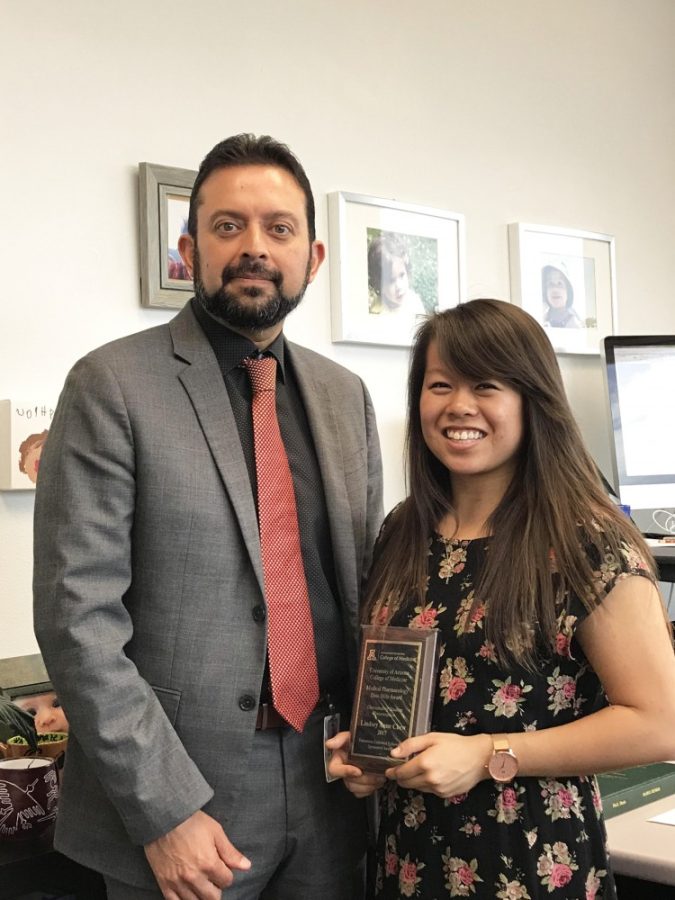Lindsey Chew, a University of Arizona neuroscience and cognitive science senior and a 2014 Flinn Foundation Scholar, will represent the state of Arizona at the 22nd annual Posters on the Hill in Washington D.C.
The event, hosted by the Council on Undergraduate Research, aims to connect politicians with undergraduate scientific researchers and their work.
Chew works in the lab of Rajesh Khanna, a professor of pharmacology and neuroscience in the College of Medicine – Tucson. Chew’s research has focused on furthering the broad goal of the whole lab to create non-opioid related pain treatments.
RELATED: ‘Marriage’ of ideas: Husband and wife team-up to combat opioid epidemic
“The opioid epidemic and the national chronic pain problem have become pressing health matters for the U.S. and the global community,” Chew said.
Last year, for example, Gov. Doug Ducey declared a statewide health emergency because of the rapid increase in the number of opioid deaths in the state.
Sodium channels are critical to the body’s pain-sensing pathways. In the past, researchers have attempted to shut them off by hammering in molecules to block them.
The Khanna lab takes a different approach.
“Our lab has been targeting non-opioid based mechanisms in order to find non-addictive, but highly effective, new clinical solutions to chronic pain,” Chew said.
The lab tries to prevent the interaction of a critical targeting protein and the sodium channels. By inhibiting this interaction, sodium channels are removed and the pain pathway dampened.
So far in rat models, no addictive properties or adverse learning and memory side effects have been attributed to this treatment.
Chew has also studied the effect of a natural compound from desert lavender on specific calcium channels and how this could relate to the pain pathway.
This science could one day provide a critical alternative to opioid pain relievers.
During Chew’s time in the lab, Khanna; his wife May Khanna, assistant professor of pharmacology and a member of the Center for Innovation and Brain Science; and Vijay Gokhale, a senior research scientist at the BIO5 Institute, teamed up to found Regulonix, a company that promotes and funds further clinical research.
“It has been an incredible opportunity to work in the Khanna lab and to see many different sides of science, from the grant writing process to the foundation of Regulonix,” Chew said.
According to Chew, her experiences in the Undergraduate Biology Research Program as well as her minors in Spanish and business administration all complemented her pursuit of scientific research.
When at Posters on the Hill, Chew and Khanna will be showing off another important side of their research.
“There is a perception that scientists and politicians make strange bedfellows,” Khanna said. “In order to get anything achieved, scientists and politicians cannot be simply divorced from each other. They must work together to understand, manage and improve our lives.”
The opioid crisis and, to a smaller extent, Posters on the Hill, offer politicians and scientists an opportunity to start a dialogue and cooperate on issues that could help the lives of millions.
According to Chew, much of the value of science lies in the ability of scientists to communicate the importance of their research to the general public.
Chew will be working with Office of Federal Relations to do just that. She will be inviting Arizona politicians to her poster presentation on Capitol Hill and discussing her research, the importance of science and her experiences as an undergraduate with them.
RELATED: $2.2 million federal grant helping Arizona Center for Rural Health combat opioid epidemic
After her trip to Washington D.C. in April, Chew will be headed off to Duke University to complete a dual M.D.-PhD program.
During her time in Tucson, Chew volunteered and helped train guide dogs for the local visually impaired community, partnering with Arizona State Schools for the Deaf and the Blind nearby.
“Volunteering, I found such a vibrant community of diverse people that came together and really cared about the puppies and each other as well as raising dogs who have a greater purpose,” Chew said.
Inspired by her experiences, Chew plans to pursue clinical research in ophthalmology, studying diseases of the eye and building upon the clinical experiences and interaction with doctors she enjoyed while working in the Khanna lab.
“Lindsey is a once-in-a-lifetime kind of student, in a league of her own so to speak,” Khanna said. “I am just privileged and honored that this amazingly talented Flinn student selected my lab to pursue her journey into science.”
Follow Randall Eck on Twitter








